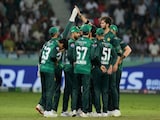After taking oath as Bihar Chief Minister an eighth time, thus continuing in the chair with a change of partners, Nitish Kumar took a shot at Prime Minister Narendra Modi over the next Lok Sabha elections: "He won in 2014, but will he in 2024?"
Here are 10 key facts about the story:
- Though Nitish Kumar repeatedly spoke of "working towards Opposition unity" to unseat the BJP at the Centre, he told reporters that he is "not a contender for anything", when asked if he wants to be PM candidate. "The question to ask is, if the person who came in 2014 will win in 2024,” he said. Elections in Bihar are due now only in 2025, a year after the Lok Sabha contest.
- Nitish is likely to still be in the chair in 2024, which means the who'll-be-the-challenger speculation isn't likely to die down soon, especially with the Congress weakened and the Opposition not yet united. It helps his case that another regional leader with national ambitions — Bengal's Mamata Banerjee — has had to halt her march after corruption charges against her party colleagues. Nitish Kumar's new deputy, RJD's Tejashwi Yadav, has said that he is "the most experienced chief minister in India right now".
- Analysts have for years floated the theory that Nitish Kumar could be Opposition candidate against PM Modi, if the Congress plays a non-leading role. But that reads shallow as he floats in and out of alliances — flexible on ideological questions. Till yesterday, he was chief minister with BJP support. And now he is back with the RJD of old pal Lalu Yadav — in a new version of a 2015 alliance.
- The first version of the JDU-RJD-Congress tie-up, called the 'Mahagathbandhan' or Grand Alliance, won power in 2015. Nitish Kumar had broken up with the BJP two years before that — ending a two-decade relationship — and resigned as chief minister. He had problems with Narendra Modi's past — particularly the 2002 Gujarat riots — and left the NDA after he became the PM face.
- But he made up with PM Modi's party in 2017, left the Grand Alliance and took a fresh oath. He stuck with the BJP in the 2019 Lok Sabha elections; and then they together won the 2020 Bihar polls.
- Today he said he did not want to be Chief Minister after the 2020 win with the BJP. "Ask people in the party (JDU), what they have been reduced too. I did not want to become CM... but I was put under pressure. Then you see what happened. I have not even spoken to you (journalists) in two months."
- He pointed towards the drop in JDU's numbers. "How many seats did we win in 2015? And then we went with the same people (BJP) and look at what we have been reduced to." Besides those in the JDU, Tejashwi Yadav too has said the BJP "usurp its partners".
- In 2015, Nitish Kumar's JDU had won 71 seats — part of the Grand Alliance's 170 — in a House of 243. The RJD was the largest party with 80, but he became chief minister as leader of the pact.
- At present, the JDU has 45 seats. The BJP, which has 77, made him chief minister in 2020 despite his lower numbers — but with two deputies from the BJP stable. Why the switch now? Nitish Kumar and his party, it is learnt, were spooked in the latest by the Maharashtra coup, in which the BJP backed a split in the Shiv Sena to return to power.
- On his fate after yet another flip, Nitish Kumar today said, "Whether I will stay or not... let people say what they have to say." After staking claim yesterday, he said he "never allowed corruption" and "we want brotherhood in society". Standing next to him, Tejashwi Yadav accused the BJP of dividing people along communal lines: "We are socialists. All of us want that the BJP's agenda shouldn't be implemented in Bihar."
Advertisement
Advertisement
Advertisement















